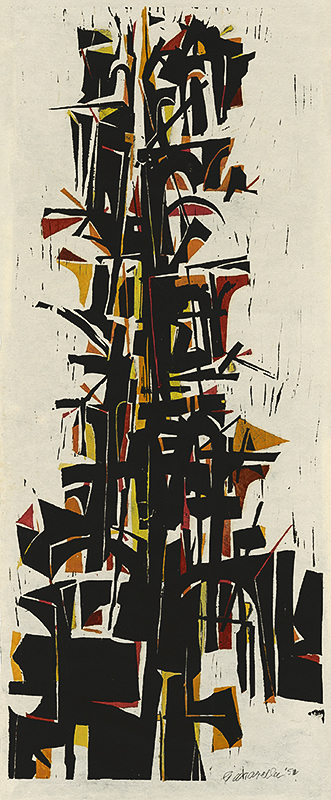
19th, 20th & 21st Century Fine Prints
707-546-7352 · fax 707-546-7924 · web: www.annexgalleries.com · email: artannex@aol.com
Civitavecchia by Edmond Casarella

Civitavecchia
Edmond Casarella
Civitavecchia
Edmond Casarella
1920 - 1996 (biography)Ed Casarella was an early practitioner of the Paper Relief print, such as this composition, starting in 1949. Using shapes cut from chipboard and illustration board he built up the surface of a plate, which was printed by hand as a relief, like a woodcut. By peeling, sanding, scraping and carving the cardboard elements he is able to control and achieve a composition that looks both spontaneous and gestural.
A description of this technique can be found on page 154 of"The Stamp of Impulse - Abstract Expressionist Prints" by David Acton, Worcester Museum, 2001.
Civitaveccia (old city) is the principal port for Rome and central Italy and the main ferry link to Sardinia. The port was founded early in the 2nd century by the emperor Trajan on a stretch of coast known as Centumcellae. The town flourished during late Roman times, but it has been attacked and destroyed over the centuries. In the 9th century when the town was under attack, the people fled to the Allumiere Mountains, where a walled town was constructed by Pope Leo IV in 854. Later the inhabitants returned to the old site, hence the name Civitaveccia.
With this color paper relief print, Casarella captured the essence of the architecture of this city with buildings stacked upon one another as they ascend the hillside overlooking the port. The verso of this impression is dark and shiny, an apparent result of transferring ink to paper by rubbing the pack of the paper with a spoon.
A printmaker, painter, and sculptor, Edmond Casarella was born in Newark, New Jersey on September 3, 1920. After studying at Cooper Union in New York, Casarella was hired by Anthony Velonis to print serigraphs at Creative Printmakers under the National Youth Administration. His stint in the military was followed with studies at the School of the Brooklyn Museum under the GI Bill between 1949 and 1951.
With his printmaking background, it was natural for him to be drawn to the printmaking courses taught by Gabor Peterdi, Louis Schanker and Vincent Longo. Casarella made his first paper relief print about 1949 and he continued to experiment with this medium throughout his printmaking career.
